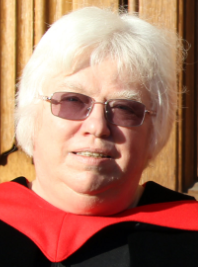Advent – a season of barrier breaking?
Advent – a season of barrier breaking?
Guest Editorial: Dr. Clare Amos

Clare Amos is a lay Anglican theologian who has been privileged during her life to study and work in both Anglican and ecumenical contexts. Her most recent positions were as Director of Theological Studies in the Anglican Communion Office (until 2011), and then until formal retirement in 2018 as head of the interreligious office at the World Council of Churches in Geneva. In 2012 she was honoured to be awarded a Lambeth DD in recognition of her work in biblical studies, theological education and interreligious engagement. In a voluntary capacity she is currently Director for Lay Discipleship in the Diocese in Europe.
One of the consequences of the ongoing global COVID crisis seems to have been that Advent has taken on more significance in our lives, and even in the life of the church, than it has seemed to do in recent years. Partly of course this is due the closure of so many shops in November due to lock-downs – which has meant that shopping for many facets of Christmas has had to be put on hold. So Advent has had the freedom to breathe before being overwhelmed by the tendrils of Christmas.
But it is more than that, and more than the fact that school and work Christmas festivities which often reach back into the beginning of December have either been cancelled or Zoomed. Our recent experiences have, I think, meant that many of us are more in tune with the themes of Advent. Even the austerity of seeking to carry out much of our ‘normal’ lives online seems to reflect the spirit of Advent. Ironically the fact that life itself in recent and imminent weeks seem to be being shaped by the hoped-for arrival of a vaccine echoes the ache of Advent, even though it may be immunization rather than incarnation that is the focus of many people’s longings.
It feels appropriate in many ways that the lectionary year which began on Advent Sunday will be taking Mark as the focus Gospel for the next twelve months. There’s a harshness and an urgency in this particular Gospel which marks it out from the others. Even its lack of a nativity story and the way that it begins directly with the call to repentance made by John the Baptist has a rightness for Advent in this particular year.
The first chapter of Mark’s Gospel opens up some rich themes which will be central to the story the evangelist will share with us in the rest of this Gospel: ‘way’; ‘beloved Son’; and ‘heavens torn apart’. What do those heavens torn open mean for us today and the life of the church? Certainly, the picture raises questions about the way that Christian tradition has all too easily divided the sacred from the secular, often to the disregard of the latter. For the open heavens which signal the start of Jesus’ public ministry affirm that God refuses to be kept apart from the whole of human life, in all its murkiness as well as its joys. It is telling that the tearing of the skies coincides with the moment of Jesus’ baptism as he is immersed in the dark waters of the river. This has been called Jesus’ ‘solidarity dip’ – when he signals his willingness to share the pain and the problems of humanity. The torn heavens mark out the ultimate barrier-breaking nature of the incarnation. Life can feel so much easier and more secure when it is separated into neat and tidy segments, when good can keep its safe distance from evil, when the holy preserves itself from the profane. But from the instant of opened heavens and immersion in deep waters, that was not the path which Jesus chose. The Episcopalian theologian Tom Troeger, one of whose wonderful hymns describes God as a ‘spendthrift lover’, was almost shattered by the senseless murder of a friend. Eventually he reflected: ‘Then in the silence of my heart I see as never before that incarnation means a refusal to keep a safe distance between heaven and earth, between eternal good and mortal evil. If we are to be godly-people we will have to follow the pattern of the incarnation, risking all for love, refusing to keep our distance from the brutality of this world.’
Advent itself can be called a season of barrier-breaking. So, it is an appropriate precursor to the celebration of the incarnation at Christmas. Are we preparing in Advent for the first coming of Jesus Christ or his second? Does the season speak to us of ending or of beginning? Is it a time of light or a time of darkness? A moment of glory or a moment of terror? Yet Advent seems to break through the barriers of such instances of ‘either/or’ and turn them somehow into ‘both/ands’. This, I believe, is the ground of the Advent hope. It is fascinating to explore the etymology for the Hebrew word for ‘hope’ tikwa, which is related to the idea of a taut string or cord, held firmly at both ends. As we celebrate Advent, held between the contrasting poles which mark out this season, we too can become part of its story, part of that taut string invited to sing out a note of hope. Karl Barth once asked, ‘What other time or season can or will the Church ever have but that of Advent?’
Advent 2020
